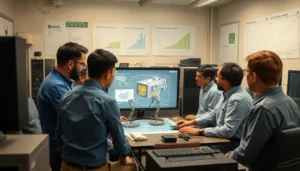Table of Contents
ToggleIn a world where robots are no longer confined to sci-fi movies, pursuing a master’s in robotics engineering could be the ultimate career power-up. Imagine designing machines that can do everything from assembling cars to performing complex surgeries. It’s like being a wizard, but instead of wands, you wield algorithms and circuits.
As industries increasingly embrace automation, the demand for skilled robotics engineers is skyrocketing. With a master’s degree, one can unlock doors to innovative roles that blend creativity and technology. So why not dive into this exciting field? After all, who wouldn’t want to say they’re shaping the future—one robot at a time? Whether it’s making life easier or just impressing friends at parties, a master’s in robotics engineering is the ticket to an electrifying career.
Overview of Masters In Robotics Engineering
Masters in robotics engineering offers advanced education for those seeking to excel in the field. These programs blend theoretical knowledge with practical skills, preparing graduates for diverse roles in the rapidly evolving robotics sector.
Definition and Purpose
Robotics engineering focuses on designing, building, and programming robotic systems. A master’s degree provides in-depth knowledge of automation technologies and their applications across industries. Programs typically cover subjects like artificial intelligence, machine learning, and control systems. Graduates gain the expertise to create innovative solutions that address complex challenges in automation. Overall, the purpose of these degrees is to equip students with the skills needed to drive advancements in robotics.
Importance of Robotics Engineering
Robotics engineering plays a crucial role in enhancing efficiency and productivity in various sectors. Many industries, including manufacturing, healthcare, and logistics, increasingly rely on automation to streamline operations. The increased use of robots in repetitive tasks leads to a decrease in human error and operational costs. Employers actively seek skilled robotics engineers who can integrate new technologies into existing systems. As automation continues to grow, the demand for expertise in robotics engineering remains strong, underscoring its importance in shaping the future of work.
Core Curriculum and Specializations

Master’s programs in robotics engineering feature a comprehensive curriculum that combines essential knowledge and specialized skills. Students engage with topics that prepare them for advanced roles in robotics.
Fundamental Courses
Core courses cover key areas vital for a solid foundation in robotics. Topics include artificial intelligence, machine learning, control systems, and robotics programming. Courses in kinematics teach movements and dynamics of robots, while computer vision provides insight into how robots perceive their environment. Algorithms and data structures enhance problem-solving skills essential for robotics applications. Systems engineering courses integrate various components, emphasizing efficient designs and project management for real-world challenges. Graduates leave with a robust understanding of robotics principles, ready to tackle industry challenges.
Elective Specializations
Elective specializations allow students to tailor their education to specific interests. Options include autonomous systems, human-robot interaction, and robotic perception. Students can explore areas such as bio-inspired robotics, which draws inspiration from natural organisms to create innovative designs. Selected courses in industrial automation focus on robotics in manufacturing and logistics. Ethical robotics provides insight into the implications of technology in society. By choosing electives aligned with career aspirations, graduates enhance their expertise, catering to various sectors such as healthcare, aerospace, and environmental science.
Admission Requirements
Admission to a master’s program in robotics engineering involves specific criteria that candidates must meet. Each university may have its own standards, so prospective students should carefully review individual program requirements.
Academic Qualifications
Candidates typically need a bachelor’s degree in engineering or a closely related field. Many programs require a minimum GPA of 3.0 on a 4.0 scale. Strong performance in mathematics, physics, and computer science courses also proves beneficial. Additionally, some programs request transcripts showing coursework in robotics or related subjects.
Application Process
The application process generally includes submitting a completed application form alongside transcripts and letters of recommendation. Personal statements allow candidates to demonstrate their motivation and interest in robotics. Many programs require standardized test scores such as the GRE, though some universities have started to waive this requirement based on other qualifications. Interviews may also be part of the selection process, providing an opportunity for candidates to showcase their skills and aspirations.
Career Opportunities
Graduates with a master’s in robotics engineering encounter diverse career paths. Industries seek skilled professionals to meet the growing demand for automation and robotics integration.
Industry Demand
Automation’s impact on various sectors fuels significant industry demand. Manufacturing leads this charge, utilizing robotics to enhance production efficiency and reduce costs. Healthcare also benefits, where robotic systems assist in surgeries and patient care. Logistics companies integrate robotics for inventory management and transportation, optimizing their operations. The shift toward smart technology creates even more opportunities, with cities adopting robotics for infrastructure maintenance and public services. As technology continues to evolve, the need for adept robotics engineers becomes a critical focus for employers across these sectors.
Potential Job Titles
Numerous job titles await robotics engineering graduates. Robotics Engineer positions often involve designing and programming robotic systems. Systems Integration Engineer roles emphasize the integration of robotics with existing technology. Research Scientists work on cutting-edge projects that advance robotics capabilities. Automation Engineers focus on optimizing automated systems in production lines. Other titles include Control Systems Engineer, which specializes in developing algorithms for robotic control, and Field Service Engineer, responsible for maintaining and troubleshooting robotic systems. The variety of potential job titles illustrates the versatile nature of careers within robotics engineering.
Top Universities Offering Masters In Robotics Engineering
Several universities excel in robotics engineering, presenting robust master’s programs designed to meet the industry’s evolving demands. These institutions provide students with access to cutting-edge resources and expert faculty.
University Rankings
Ranked among the top choices, the Massachusetts Institute of Technology (MIT) leads in robotics education, consistently recognized for its innovative research. Stanford University follows closely, noted for combining engineering principles with a strong emphasis on artificial intelligence. Carnegie Mellon University stands out as a pioneer in robotics, offering comprehensive courses and engaging research opportunities. Additionally, the University of California, Berkeley, features a strong curriculum that prepares graduates for diverse applications in robotics. The University of Michigan and Georgia Institute of Technology also remain competitive, known for their hands-on projects and industry partnerships.
Program Highlights
Robotics master’s programs emphasize both theoretical foundations and practical applications. Core courses typically involve kinematics, machine learning, and control systems, designed to equip students with essential skills. Many universities offer specialized electives, allowing students to explore topics like autonomous systems and human-robot interaction in depth. Hands-on experiences often manifest through project-based learning, internships, and collaborations with industry leaders, ensuring real-world readiness. Research opportunities flourish in these programs, encouraging innovative projects that lead to advancements in robotics technology. Students benefit from state-of-the-art laboratories, fostering creativity and exploration in robotic design and programming.
Pursuing a master’s in robotics engineering opens doors to a dynamic and rapidly evolving field. Graduates are well-positioned to lead the charge in automation and innovative technologies. With a strong foundation in both theory and practical skills, they can tackle real-world challenges across various industries.
The growing reliance on robotics ensures that skilled professionals will remain in high demand. As industries continue to embrace automation, the opportunities for creative problem-solving and technological advancement are limitless. Embracing this path not only promises a fulfilling career but also contributes to shaping the future of work.






